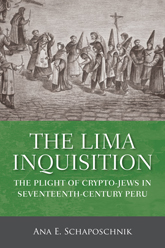The Lima Inquisition
The Plight of Crypto-Jews in Seventeenth-Century Peru
Ana E. Schaposchnik
“Schaposchnik revises and enriches our understanding of the Inquisition in
colonial Peru and provides a major contribution to the emerging literature
on politics, culture, and identity in seventeenth-century Latin America.”
—James Krippner, Haverford College
The Holy Office of the Inquisition (a royal tribunal that addressed issues of heresy
and offenses to morality) was established in Peru in 1570 and operated there until
1820. In this book, Ana E. Schaposchnik provides a deeply researched history of
the Inquisition’s Lima Tribunal, focusing in particular on the cases of persons put
under trial for crypto-Judaism in Lima during the 1600s.
Delving deeply into the records of the Lima Tribunal, Schaposchnik brings
to light the experiences and perspectives of the prisoners in the cells and
torture chambers, as well as the regulations and institutional procedures of the
inquisitors. She looks closely at how the lives of the accused—and in some cases
the circumstances of their deaths—were shaped by actions of the Inquisition on
both sides of the Atlantic. She explores the prisoners’ lives before and after their
incarcerations and reveals the variety and character of prisoners’ religiosity, as
portrayed in the Inquisition’s own sources. She also uncovers individual and
collective strategies of the prisoners and their supporters to stall trials, confuse
tribunal members, and attempt to ameliorate or at least delay the most extreme
effects of the trial of faith.
The Lima Inquisition also includes a detailed analysis of the 1639 Auto
General de Fe ceremony of public penance and execution, tracing the agendas
of individual inquisitors, the transition that occurred when punishment and
surveillance were brought out of hidden dungeons and into public spaces, and the
exposure of the condemned and their plight to an avid and awestricken audience.
Schaposchnik contends that the Lima Tribunal’s goal, more than volume or
frequency in punishing heretics, was to discipline and shape culture in Peru.
 Ana E. Schaposchnik is an associate professor of history at DePaul University.
Ana E. Schaposchnik is an associate professor of history at DePaul University.
Praise
“An in-depth look at the trials of the Great Complicity in the 1630s, during which almost 100 people, overwhelmingly men and women of Portuguese origin, were accused of being crypto-Jews and detained and tried by the Inquisition. Recommended.”
—Choice
“The Lima Inquisition reveals the
details of the Americas’ most
alarming Inquisitorial crackdown:
the ‘Great Complicity’ and
subsequent Auto de Fe of Lima in
1639. Schaposchnik convincingly
shows that it was not an aberration
or just another Baroque-era
spectacle—it was the essence of
what the Inquisition was and had
been all about, from inception
to abolition.”
—Kris Lane, Tulane
University
“[A] major strength of The Lima Inquisition is its transatlantic focus. . . . Schaposchnik also impresses with her ability to transform the inner world of tribunal facilities into a subject for historical study.”
—Canadian Journal of Latin American and Caribbean Studies
|

Larger images
New in Paperback!
June 2017
LC: 2015008394 BX
294 pp. 6 x 9
1 table
|

